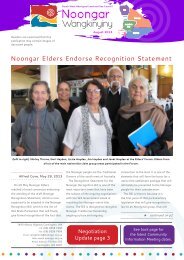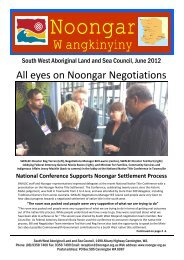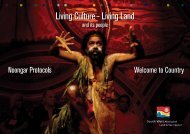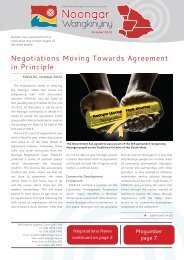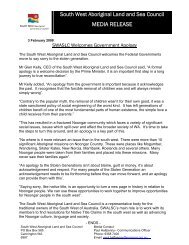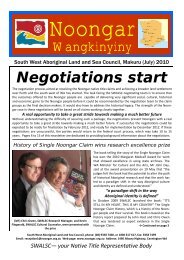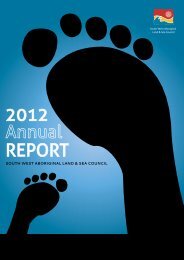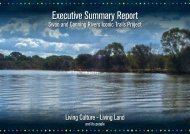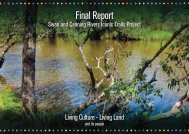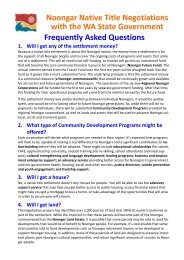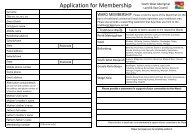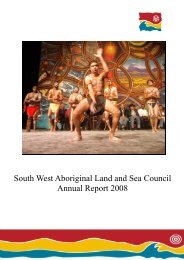Noongar Consultation Protocol Guidelines - South West Aboriginal ...
Noongar Consultation Protocol Guidelines - South West Aboriginal ...
Noongar Consultation Protocol Guidelines - South West Aboriginal ...
You also want an ePaper? Increase the reach of your titles
YUMPU automatically turns print PDFs into web optimized ePapers that Google loves.
<strong>Noongar</strong> <strong>Consultation</strong> <strong>Protocol</strong> <strong>Guidelines</strong><br />
Swan and Canning Rivers Iconic Trails Project<br />
Living Culture - Living Land<br />
and its people
1<br />
Each of these correlate with different geographic<br />
areas that have ecological distinctions:<br />
Geraldton Sandplains Amangu and Yued<br />
Swan Coastal Plain<br />
Avon Wheatbelt<br />
Jarrah Forest<br />
Warren<br />
Yued, Whadjuk, Binjareb/<br />
Pinjarup and Wardandi<br />
Balardong, Nyakinyaki,<br />
Wilman<br />
Whadjuk, Binjareb/<br />
Pinjarup, Balardong,<br />
Wilman, Ganeang/Goreng<br />
Bibulmun, Mineng<br />
Respect Culture;<br />
Recognise Traditions;<br />
Reconcile Past<br />
and Present<br />
The Swan and Canning Rivers are significant sites<br />
for <strong>Noongar</strong> people and as such are listed on the<br />
Register of <strong>Aboriginal</strong> Sites under the <strong>Aboriginal</strong><br />
Heritage Act 1972.<br />
<strong>Noongar</strong> people’s country covers the entire southwestern<br />
portion of <strong>West</strong>ern Australia. The boundary<br />
commences on the west coast at a point north of<br />
Jurien Bay, proceeds roughly easterly to a point<br />
approximately north of Moora and then roughly<br />
south-east to a point on the southern coast<br />
between Bremer Bay and Esperance.<br />
<strong>Noongar</strong> are made up of fourteen different<br />
language groups:<br />
Amangu, Yued, Wadjuk, Binjareb, Wardandi,<br />
Balardong, Nyakinyaki, Wilman, Ganeang,<br />
Bibulmun, Mineng, Goreng and Wudjari and Njunga<br />
Mallee<br />
Wilmen, Goreng and<br />
Wudjari<br />
Esperance Plains Njunga<br />
Funding Assistance for this project provided by<br />
Lotterywest<br />
This report has been prepared by the <strong>South</strong> <strong>West</strong><br />
<strong>Aboriginal</strong> Land and Sea Council<br />
Warning: this report contains images of<br />
deceased persons
Introduction<br />
2<br />
Disclaimer: The term <strong>Noongar</strong> (alternative spellings<br />
include Nyungar, Nyoongar, Nyoongah, Nyungah,<br />
Nyugah, Yunga) is inclusive of all <strong>Aboriginal</strong> people<br />
in the <strong>South</strong> <strong>West</strong> region of <strong>West</strong>ern Australia.<br />
Throughout this document the term <strong>Noongar</strong> has<br />
been used in accordance with the way in which the<br />
<strong>South</strong> <strong>West</strong> <strong>Aboriginal</strong> Land and Sea Council refer<br />
to the <strong>Aboriginal</strong> people of the <strong>South</strong> <strong>West</strong> region.<br />
These <strong>Protocol</strong> <strong>Guidelines</strong> form a living document<br />
that will be adjusted over time in consultation with<br />
the Traditional Owners of the Perth Metropolitan<br />
Region.<br />
These <strong>Protocol</strong> <strong>Guidelines</strong> have been developed as<br />
part of the <strong>Noongar</strong> Values project on the Derbarl<br />
Yerrigan and Djarlgarro Beelier. The project has<br />
been undertaken in partnership with Perth Region<br />
NRM with funding provided by Lotterywest.<br />
The purpose of this document is to enable the<br />
Swan River Trust to more effectively engage with<br />
the <strong>Noongar</strong> community in relation to activities in<br />
and around the Derbarl Yerrigan and Djarlgarro<br />
Beelier. It is essential that the <strong>Noongar</strong> community<br />
has meaningful participation in caring for the<br />
Derbarl Yerrigan and Djarlgarro Beelier and has<br />
maximum opportunities to participate in policy and<br />
decision making for the river system.<br />
This document will assist in the establishment<br />
of a strong partnership between the <strong>Noongar</strong><br />
community and the Swan River Trust based on<br />
mutual respect, trust and acknowledgement of<br />
cultural difference.<br />
The core purpose of these <strong>Protocol</strong> <strong>Guidelines</strong> is<br />
to ensure full and effective <strong>Noongar</strong> engagement<br />
to fulfil the following key aspirations of the <strong>Noongar</strong><br />
community – caring for country by restoring<br />
<strong>Noongar</strong> rights and obligations to country; and<br />
maintaining and recognising both <strong>Noongar</strong> men’s<br />
and women’s cultural connections to country.<br />
There are several key elements to effective<br />
consultation with <strong>Noongar</strong>s and this document sets<br />
out some of the important protocols for the Swan<br />
River Trust in consulting <strong>Noongar</strong>s. It also outlines<br />
a guiding process to be followed to ensure full and<br />
proper participation by the <strong>Noongar</strong> community.<br />
These key elements include:<br />
• Principles<br />
• <strong>Protocol</strong>s<br />
• Process / Engagement <strong>Guidelines</strong><br />
The <strong>South</strong> <strong>West</strong> <strong>Aboriginal</strong> Land and Sea Council<br />
has established contacts throughout the <strong>Noongar</strong><br />
community to enable meaningful participation<br />
to occur. There may be other organisations and<br />
Government Departments that can assist, however<br />
in recognition of the Traditional Owners of <strong>Noongar</strong><br />
country the <strong>South</strong> <strong>West</strong> <strong>Aboriginal</strong> Land and Sea<br />
Council should be the first point of contact for<br />
consultation with the <strong>Noongar</strong> community.
Principles 3<br />
Any consultation, dialogue, discussion, negotiation<br />
or conversation with the <strong>Noongar</strong> community<br />
should be based on fundamental principles to<br />
ensure their meaningful participation in decision<br />
making. These principles include:<br />
Free, prior and informed consent<br />
<strong>Consultation</strong> should include the provision of<br />
sufficient information for people to make an<br />
informed decision about the activity with sufficient<br />
time to consider options and discuss with other<br />
members of the community. Remember <strong>Noongar</strong>s<br />
have the right to say ‘no’.<br />
Mutual respect<br />
It is essential that the consultation process<br />
demonstrates respect for the views of both parties.<br />
Respect for consultation protocols and cultural<br />
values will build the respect of the <strong>Noongar</strong><br />
community and establish a positive and long term<br />
relationship.<br />
Nation building / relationship building – equal<br />
partnership between <strong>Noongar</strong> and non-<strong>Noongar</strong><br />
communities<br />
The purpose of consultation is to develop a<br />
relationship based on trust and understanding<br />
as well as mutual respect. Acknowledging the<br />
views and opinions of the <strong>Noongar</strong> community<br />
and actively adopting their ideas and suggestions,<br />
including demonstrating an understanding of<br />
<strong>Noongar</strong> values, will lead to a richer community<br />
with beneficial outcomes for all.<br />
Acknowledgement of <strong>Noongar</strong> country<br />
Acknowledgement of Traditional Owners of<br />
<strong>Noongar</strong> country is fundamental to building a<br />
positive relationship. Statements acknowledging<br />
prior possession and occupation of country for<br />
at least 45,000 years are essential elements of<br />
understanding <strong>Noongar</strong> values.<br />
Acknowledgement of <strong>Noongar</strong> culture<br />
Acknowledging that <strong>Noongar</strong> culture has a unique<br />
place in the community is an essential building<br />
block for a positive relationship. The <strong>Noongar</strong><br />
community can bring a different perspective to<br />
projects that will enrich and diversify the overall<br />
outcome.<br />
Acknowledgement of <strong>Noongar</strong> knowledge and<br />
expertise<br />
<strong>Noongar</strong>s have at least 45,000 years of built up<br />
knowledge and expertise in having a harmonious<br />
relationship with the environment and country.<br />
By way of example, the <strong>Noongar</strong> community<br />
can bring a special expertise to managing the<br />
environment that can add value to any scientific<br />
and environmental management process.<br />
Understanding that <strong>Noongar</strong>s live their culture<br />
<strong>Noongar</strong> culture is not something that is ‘practiced’<br />
when an opportunity presents itself. Culture is the<br />
lived and living experience of day to day life – an<br />
active relationship between people, families, family<br />
life, traditions and country. <strong>Noongar</strong> culture is<br />
constantly enriched through history and experience.<br />
It should be respected and acknowledged that<br />
<strong>Noongar</strong> culture has also been shaped by a unique<br />
history based on oppression, dispossession,<br />
disempowerment and racism.<br />
Women’s / Men’s Business<br />
Men and Women in the <strong>Noongar</strong> community have<br />
different cultural responsibilities. These different<br />
responsibilities have to be recognised and respected.
<strong>Protocol</strong>s<br />
4<br />
It is important to follow certain protocols to ensure<br />
a successful consultation process. Proponents of<br />
projects should be mindful of these protocols and<br />
develop the consultation process with these in<br />
mind.<br />
Early engagement<br />
To ensure meaningful participation of the <strong>Noongar</strong><br />
community, it is important to engage early with the<br />
relevant groups to ensure a more integrated and<br />
beneficial outcome. Ongoing contact with groups<br />
is important to ensure the relationship remains<br />
positive.<br />
Create Realistic Timeframes<br />
<strong>Noongar</strong> governance processes are complex with<br />
extended family networks needing to be kept<br />
informed as part of the consultation process. It is<br />
important to recognise that meaningful engagement<br />
will take time, and sufficient time for proposals<br />
will be required for consideration by the <strong>Noongar</strong><br />
community. It is also important to remember that<br />
<strong>Noongar</strong> Elders and spokespeople often have<br />
competing commitments and are usually engaged<br />
in multiple projects.<br />
Cultural <strong>Protocol</strong>s<br />
It is respectful to seek permission before taking<br />
photos of people as well as using their quotes<br />
and information. It is important to remember that<br />
attending funerals for sorry business will always<br />
take precedence over other commitments.<br />
Resources<br />
Full and effective participation requires fair and<br />
equitable resources to achieve beneficial outcomes.<br />
<strong>Noongar</strong> expertise is a commodity and should not<br />
be exploited. Generally, <strong>Noongar</strong>s lack the personal<br />
resources to enable their constant involvement and<br />
therefore resources should be provided for services<br />
rendered. Resources may include:<br />
• Welcome to Country expenses<br />
• <strong>Consultation</strong> fees<br />
• Meeting expenses<br />
• Admin support<br />
• Catering<br />
• Transport / travel allowance<br />
Welcome to Country /<br />
Acknowledgement of Country<br />
It may be appropriate to engage a recognised Elder<br />
in their local community to conduct a Welcome<br />
to Country as a courtesy and acknowledgement<br />
of the Traditional Owners at meetings. The <strong>South</strong><br />
<strong>West</strong> <strong>Aboriginal</strong> Land and Sea Council can assist<br />
in providing appropriate people to conduct such<br />
work. A statement of acknowledgement, as a sign<br />
of respect, should be made by the convenors at the<br />
start of each official meeting.
5<br />
Intellectual Property Rights<br />
Cultural and intellectual property rights should<br />
be recognised and protected. Approval must be<br />
given by an appropriate <strong>Noongar</strong> representative on<br />
the use and representation of <strong>Noongar</strong> heritage,<br />
language, cultural and intellectual property.<br />
Essentially, <strong>Aboriginal</strong> cultural and intellectual<br />
property refers to <strong>Aboriginal</strong> peoples’ rights to their<br />
heritage. ‘Heritage’ consists of the tangible and<br />
intangible aspects of the body of cultural practices,<br />
resources and knowledge systems that have been<br />
developed nurtured and refined (and continue to<br />
be developed, nurtured and refined) by <strong>Aboriginal</strong><br />
people and passed on by <strong>Aboriginal</strong> people as part<br />
of expressing their cultural identity. 1<br />
Confidentiality<br />
The purpose for which information is obtained and<br />
used should be a source of constant negotiation<br />
and agreement. Confidentiality and privacy<br />
are serious issues for the <strong>Noongar</strong> community,<br />
particularly information that is culturally complex<br />
such as ‘women’s business’ or ‘men’s business’.<br />
Such information should be acknowledged and<br />
recorded or stored in a respectful and culturally<br />
appropriate way.<br />
Showing Results<br />
Demonstrating that <strong>Noongar</strong> concerns, suggestions<br />
and ideas have been taken into consideration<br />
is critical to building an enduring and respectful<br />
relationship. Meaningful engagement also involves<br />
continual involvement of the <strong>Noongar</strong> community in<br />
processes and timelines. <strong>Noongar</strong>s should share in<br />
any economic opportunities from the project and be<br />
able to take advantage of any future opportunities<br />
for participation.<br />
1. Janke, T. and Quiggan, R. Background Paper 12: Indigenous Cultural and Intellectual Property and Customary Law. Law Reform Commission of <strong>West</strong>ern Australia. http://www.lrc.<br />
justice.wa.gov.au/ 2publications/reports/ACL/BP/BP-12.pdf (accessed 2 December 2010).
Process / Engagement <strong>Guidelines</strong> 2<br />
6<br />
1. Contact the <strong>South</strong> <strong>West</strong> <strong>Aboriginal</strong> Land and<br />
Sea Council who will advise on the appropriate<br />
people to consult, ensuring that both men and<br />
women are included. SWALSC can also provide<br />
suggestions for meeting places and advice<br />
on any specific cultural protocols, including<br />
timing, upcoming events etc. SWALSC may be<br />
able to provide a specific mailing list of people<br />
who would be appropriate to talk to about your<br />
project.<br />
2. Once the relevant people have been identified,<br />
arrange an initial meeting to outline the scope<br />
of the works or project that you wish to<br />
undertake. At the meeting ensure information<br />
is clearly set and all factual information is<br />
presented. Information could include:<br />
• Potential impacts of the project on the river<br />
and adjoining areas;<br />
• Any prior discussions with other stakeholders;<br />
• Any maps, data or technical information.<br />
3. Ensure that <strong>Noongar</strong> groups are afforded<br />
sufficient time to consider the information.<br />
There may also be further consultation that<br />
participants need to do with other members<br />
of the community. Remember that <strong>Noongar</strong><br />
governance processes are complex and time<br />
consuming therefore ensure you allow sufficient<br />
time for this to occur.<br />
4. At this initial meeting establish the ongoing<br />
process for consultation and level of<br />
involvement of the <strong>Noongar</strong> community for the<br />
project. This may include establishing a specific<br />
working group or more broad consultation.<br />
Consider any employment opportunities for<br />
local <strong>Noongar</strong> people.<br />
5. Ensure the ongoing involvement of interested<br />
<strong>Noongar</strong>s in the project. It is critical to actively<br />
illustrate that <strong>Noongar</strong> comments, concerns<br />
and suggestions have been taken into<br />
consideration.<br />
6. The Swan and Canning Rivers are both<br />
registered <strong>Aboriginal</strong> sites of significance which<br />
may mean the project impacts on a culturally<br />
sensitive area. It may also be important to<br />
undertake relevant Section 18 clearances<br />
for the project. This may require <strong>Noongar</strong><br />
involvement in monitoring, management and<br />
rehabilitation activities. Ensure that appropriate<br />
processes are undertaken to identify<br />
appropriate people to carry out these activities,<br />
recognising that time may be needed to reach a<br />
consensus on both appropriate methods to be<br />
used and the individuals to carry them out.<br />
7. Ensure ongoing feedback and review of<br />
the project with relevant <strong>Noongar</strong>s. This is<br />
particularly important if there is a significant<br />
impact on the river system.<br />
2. A useful document for consultation is “Ask First – A guide to respecting Indigenous heritage places and values” available from the Australian Heritage Commission.
Phase II – Swan and Canning Rivers Iconic Trails Project<br />
7<br />
Phase II of the Swan and Canning Rivers Iconic<br />
Trails Project under the auspices of the Swan River<br />
Trust involves further consultation with the <strong>Noongar</strong><br />
community to ensure agreement on the placement<br />
of signs. Further consultation needs to be done to<br />
reach consensus on the language, stories, artwork<br />
and placement of the signs along the Trail.<br />
As outlined in the final report of the Swan and<br />
Canning Rivers Iconic Trails Project, the signs<br />
along the Iconic Trails should reflect <strong>Noongar</strong><br />
values about the Swan and Canning River<br />
systems. Signs should include stories about<br />
<strong>Noongar</strong> culture, traditions and history as well as<br />
cultural responsibilities. Signs should also reflect<br />
<strong>Noongar</strong> concerns in relation to the environmental<br />
degradation of the river systems.<br />
Through stories, the <strong>Noongar</strong> community have<br />
indicated a number of possible signage locations as<br />
significant areas that hold strong cultural value for<br />
our people. However, this is a preliminary indication<br />
of where signage should go and it is recommended<br />
that further consultation will need to be undertaken<br />
to ensure other sites have not been missed and that<br />
all community members are comfortable with those<br />
sites already highlighted.<br />
It is also recommended in the report that an<br />
Advisory Group be established that includes<br />
members of the <strong>Noongar</strong> community to provide<br />
advice on the language, content and artwork<br />
for individual signs, consultation should occur<br />
particularly with Elders throughout the community.<br />
The <strong>South</strong> <strong>West</strong> <strong>Aboriginal</strong> Land and Sea Council<br />
will consult with the community about the most<br />
appropriate people to participate in the Advisory<br />
Group.<br />
As outlined in the Report, key elements for the<br />
signage could include, but not be limited to:<br />
Sense of Place:<br />
• <strong>Noongar</strong> artwork – a theme could be adopted for<br />
all signs along the trail;<br />
• <strong>Noongar</strong> place names;<br />
• <strong>Noongar</strong> Stories;<br />
• Historical photos of people and places (signage<br />
at Success Hill as an example);<br />
Ecosystem Health:<br />
• Environmental significance of the area to the<br />
<strong>Noongar</strong> community including bush tucker (if<br />
acceptable);<br />
• Environmental protection responsibilities (loss<br />
of habitat for Carnaby Cockatoos, death of river<br />
dolphins, pollution etc);<br />
Community Benefit:<br />
• Cultural and social significance for the <strong>Noongar</strong><br />
community;<br />
• Historical significance for the <strong>Noongar</strong><br />
community;<br />
Economic Benefit:<br />
• Initiatives undertaken in that specific area<br />
that has included involvement of the <strong>Noongar</strong><br />
community, i.e. employment of <strong>Noongar</strong> river<br />
rangers;<br />
It is recommended that signage include particular<br />
stories, however where the information is culturally<br />
sensitive, such as women’s stories, a cultural<br />
custodian could be listed on the sign. A final list of<br />
signage criteria should be developed through the<br />
Advisory Group.
<strong>South</strong> <strong>West</strong> <strong>Aboriginal</strong><br />
Land & Sea Council<br />
Supported by:<br />
Partners:<br />
Produced by<br />
<strong>South</strong> <strong>West</strong> <strong>Aboriginal</strong> Land & Sea Council<br />
suppor ted<br />
1490 Albany Highway<br />
Cannington WA 6107<br />
Ph: 08 9358 7400<br />
Fax: 08 9358 7499



